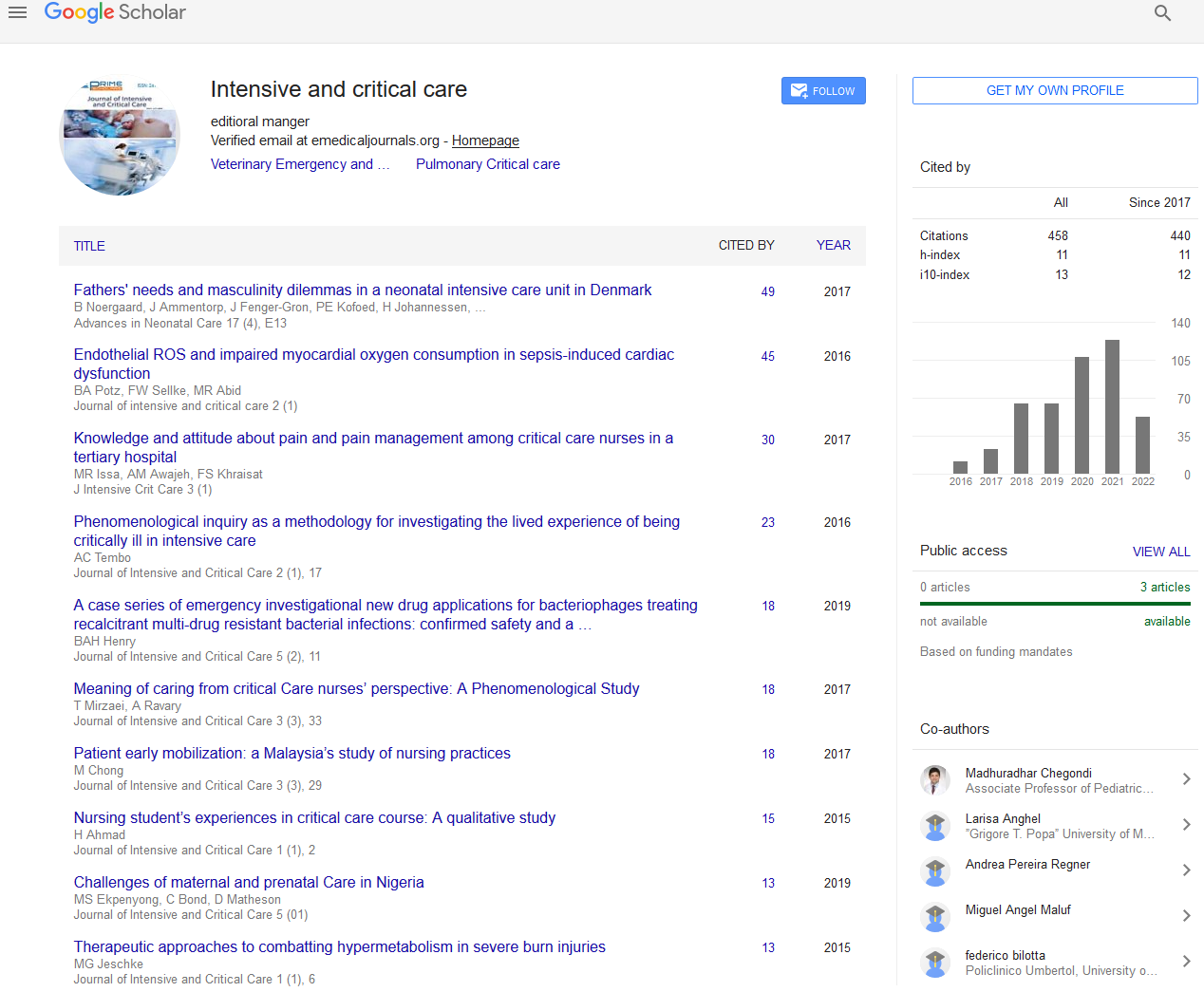Commentary - (2023) Volume 9, Issue 3
Palliative Care Physician's Discernments of Conditions Required to Supply Early Palliative Care
Eric L Krakauer*
Department of Palliative Care, University of Medicine and Pharmacy, USA
*Correspondence:
Eric L Krakauer,
Department of Palliative Care, University of Medicine and Pharmacy,
USA,
Email:
Received: 31-May-2023, Manuscript No. IPJICC-23-16787;
Editor assigned: 02-Jun-2023, Pre QC No. IPJICC-23-16787 (PQ);
Reviewed: 16-Jun-2023, QC No. IPJICC-23-16787;
Revised: 21-Jun-2023, Manuscript No. IPJICC-23-16787 (R);
Published:
28-Jun-2023, DOI: 10.35248/2471-8505-9.3.26
Description
Palliative care and cancer treatment are not mutually exclusive;
they can and should be integrated. Palliative care can be
initiated at the time of diagnosis alongside curative treatment
and continue throughout the treatment process. This approach
ensures that patients receive comprehensive care addressing
both their disease-specific treatment needs and their overall
well-being. Studies have shown that early integration of palliative
care alongside cancer treatment can significantly improve
outcomes. Patients receiving concurrent palliative care experience
better pain control, reduced hospitalizations, improved
symptom management, and enhanced quality of life. Furthermore,
early integration of palliative care does not impede
cancer treatment; instead, it complements it by addressing
the patient’s physical, emotional, and psychosocial needs. By
embracing a patient-centred approach that prioritizes physical
comfort, emotional well-being, and open communication, we
can provide compassionate care that supports both patients
and their loved ones throughout the cancer journey. Collaborative
efforts are necessary to integrate palliative care into standard
heart failure management protocols and ensure that it is
readily available to all patients who can benefit from its comprehensive
approach. By coordinating with oncology teams,
palliative care specialists ensure that patients receive the necessary
medical interventions while also addressing their palliative
care requirements. The continuity of care minimizes gaps
and enhances the patient’s experience. Cancer affects not only
the patients but also their caregivers, who play a vital role in
providing support and assistance. Palliative care recognizes the
needs of caregivers and offers support, education, and respite
services. By addressing caregiver burnout and providing practical
guidance, palliative care helps maintain a supportive environment
for both the patient and their loved ones. Furthermore,
research into the effectiveness of palliative care in heart
failure is essential to provide evidence-based guidelines and promote its integration into routine care. This includes studying
the impact of palliative care on patient outcomes, quality
of life, healthcare utilization, and healthcare costs. This proactive
approach helps identify and address changes in physical,
emotional, and psychological well-being, ensuring that interventions
are timely and effective. Pain is common in individuals
with advanced dementia but often goes unrecognized and undertreated.
Palliative care teams prioritize pain management
through a combination of pharmacological and non-pharmacological
interventions. This includes using medications, physical
therapies, massage, aromatherapy, and other techniques to
alleviate discomfort and improve overall well-being. Advanced
dementia can be emotionally challenging for both individuals
and their families. Palliative care teams provide emotional support,
counselling, and guidance, assisting families in navigating
grief, loss, and difficult decision-making processes. They also
encourage open communication and facilitate family meetings
to ensure that everyone is on the same page regarding care
goals and end-of-life preferences. Individuals with advanced
dementia benefit from a familiar and supportive environment.
Palliative care teams work with families and caregivers to create
a calm and comforting space that promotes engagement,
sensory stimulation, and emotional well-being. This may involve
incorporating familiar objects, photographs, and music,
and ensuring proper lighting and noise control. By effectively
managing symptoms, addressing emotional needs, and providing
personalized care, palliative care significantly improves the
quality of life for individuals with advanced dementia.
Acknowledgement
None.
Conflict Of Interest
The authors declare no conflict of interest.
Citation: Krakauer EL (2023) Palliative Care Physicianâ??s Discernments of Conditions Required to Supply Early Palliative Care. J Intensive Crit Care. 9:26.
Copyright: © 2023 Krakauer EL. This is an open-access article distributed under the terms of the Creative Commons Attribution License, which permits unrestricted use, distribution, and reproduction in any medium, provided the original author and source are credited.

